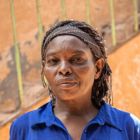Non-communicable diseases and ageing
Challenging the myths to improve health for all at all ages
Chronic diseases such as diabetes, cancer and hypertension, known as 'non-communicable diseases' or NCDs, disproportionately affect older people, and the numbers affected are growing in low and middle-income countries. Yet ill health in older age is not inevitable, and cost-effective interventions can keep people healthier for longer, with huge social and economic benefits.
The UK Government has the chance to help tackle this through its international development work. The fourth United Nations (UN) High-Level Meeting (HLM) on NCDs in 2025 is a crucial opportunity to help drive change.

"I was in very bad shape. I visited the hospital and was recommended to use a wheelchair. I had high blood pressure and was diabetic. But from the health training, we were taught the kind of foods to cut down on eating. I have improved. I can jump a little and sing."
Recommendations for the UK Government
- Use the 2025 UN High-Level Meeting on NCDs to recognise and respond to the disproportionate impact of NCDs on older people, taking the lead to ensure that inclusion and equity are embedded within the Political Declaration.
- Allocate specific funding to NCDs as part of the UK’s global health and health system strengthening objectives. Match financing to the scale of the disease and disability burden, with a focus on those who are most marginalised.
- Drive implementation of cost-effective interventions and evidence-based NCD policies to achieve progress on health and well-being for people of all ages. Ensure that NCDs are mainstreamed into progress toward Universal Health Coverage (UHC) which is fit for an ageing world.
- Ensure the meaningful involvement of civil society and local actors in the design and delivery of its health programmes in low and middle-income countries. Make older people with lived experience of NCDs, and Older People’s Associations, central to this.
- Advocate for removal of discriminatory upper age caps in global NCD target setting as part of the 2025 HLM negotiations. Adopt a more rights-based indicator, such as Age-Standardised Years of Life Lost, which avoids the arbitrary cut-off at 70 years old.
- Take the lead on strengthening the collection, analysis, reporting and use of age, sex and disability disaggregated data for people of all ages, to inform equity-based responses.
Download and read the policy briefing in full to find out more.
A better world for older people
We’ve outlined the 5 Easy Actions the UK Government can take to improve the lives of older people globally and create a safer, more prosperous world
David Lammy, Make History
We asked the UK Foreign Secretary to champion the rights of older people everywhere
